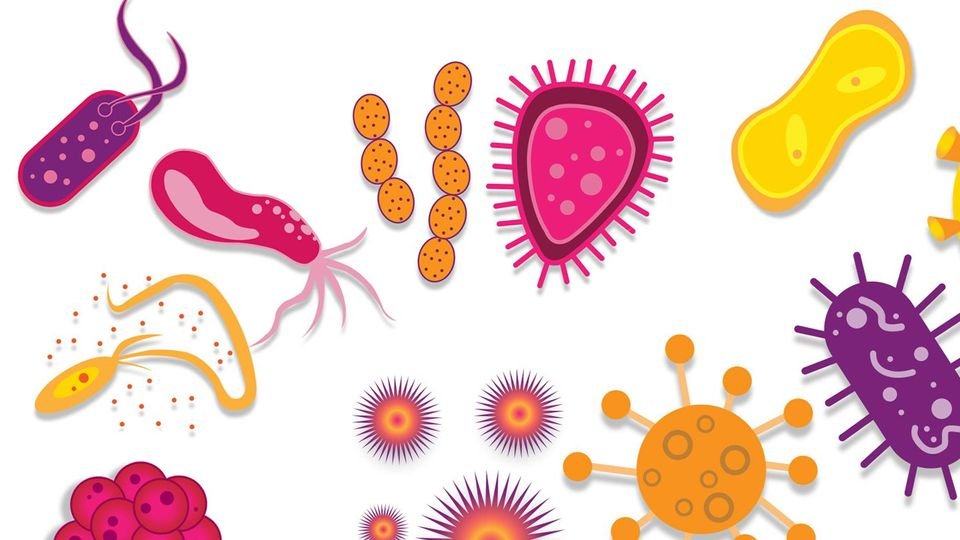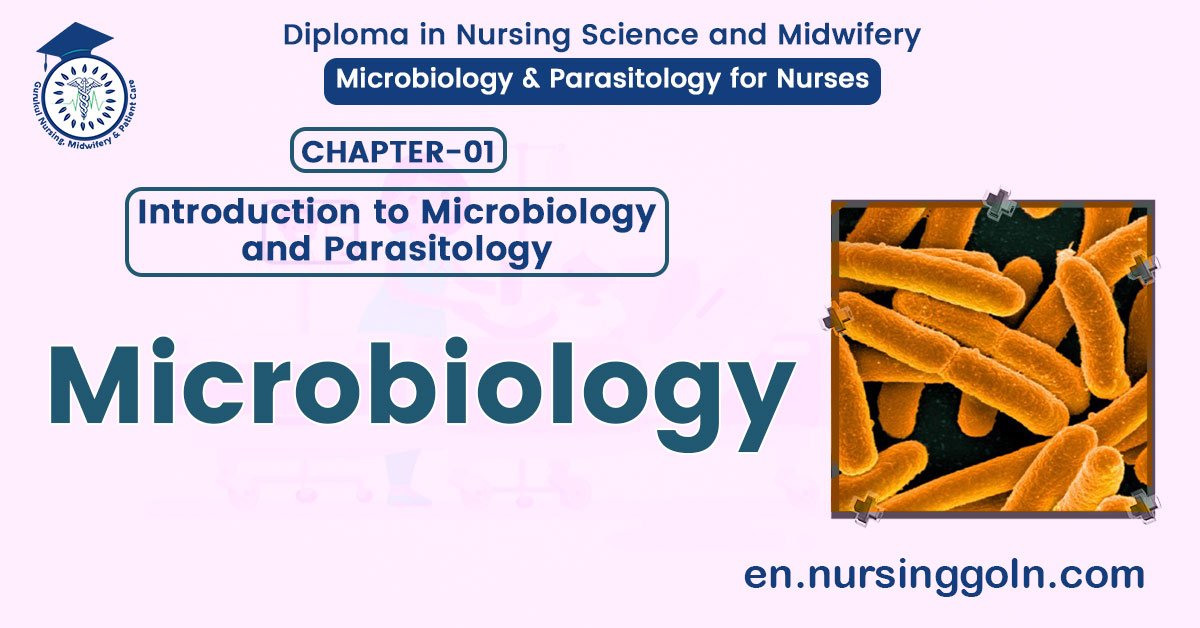Concept about Microbiology – Basic microbiology, parasitology, and immunology; nature, reproduction, growth, and transmission of common microorganisms and parasites in Bangladesh; prevention including universal precaution and immunization, control, sterilization, and disinfection; and specimen collections and examination. Students will have an understanding of common organisms and parasites caused human diseases and acquire knowledge about the prevention and control of those organisms.
Concept about Microbiology
Essentially, microbiology is the study of biological organisms that are too small to be seen with the naked eye (without using such tools as the magnifying glass or microscope etc). Microbiology is therefore dedicated to studying the lives and characteristics of a wide variety of organisms ranging from bacteria and archaea to parasitic worms in their environments.

Here, the discipline is used to learn about all aspects of the organisms in order to not only determine how they live in their environment, but also how they impact their respective surroundings and thus other organisms around them (human beings, animals, etc).
Microbiology has proved to be one of the most important disciplines in biology, making it possible to identify how some of these organisms cause diseases, discover cures for such diseases and even use some microbes for industrial purposes etc.
Definition of Microbiology:
The word ‘Microbiology’ derives from three separate words-
- Micro (small)
- Bios (life)
- Logos (knowledge).
So, literally Microbiology means ‘the study of small living things’.
Microbiology may be defined as “the science that deals with the study of small living organisms either microscopic or sub-microscopic creatures.”
Or
Microbiology is the study of microorganisms, those being unicellular (single cell), multicellular (cell colony), or acellular (lacking cells). Microbiology encompasses numerous sub-disciplines including virology, parasitology, mycology and bacteriology.
Or
Microbiology is the study of microscopic organisms, such as bacteria, viruses, archaea, fungi and protozoa. This discipline includes fundamental research on the biochemistry, physiology, cell biology, ecology, evolution and clinical aspects of microorganisms, including the host response to these agents.

Fields and Scope of Microbiology
Microbiology has two major fields:
1. Pure Microbiology
2. Applied Microbiology
Pure microbiology
On the basis of taxonomical classification
- Bacteriology
- Mycology
- Phycology
- Virology
- Protozoology
- Immunology
On the basis of Integrative characteristics
- Microbial cytology
- Microbial physiology
- Microbial genetics
- Microbial ecology
- Microbial taxonomy
- Cellular Microbiology
- Molecular Microbiology
Applied Microbiology
On the basis of application
- Medical Microbiology
- Veterinary Microbiology
- Public Health Microbiology
- Industrial Microbiology
- Pharmaceutical Microbiology
- Agriculture Microbiology
✓ Plant Microbiology
✓ Soil Microbiology
- Food and Dairy Microbiology
- Environmental Microbiology
- Water/Aquatic Microbiology
- Aero-microbiology
- Microbial Biotechnology
- Vaccinology
- Chemotherapy
Scope of Microbiology
Ecology and environment:
- Bacteria are primary decomposers – recycle nutrients back into the environment (sewage treatment plants)
- Winogradsky and M. Beijerinck studied soil microbes and their role in the biochemical cycles of sulfur, carbon, nitrogen etc.
- Insect Pest Control: some bacteria are used as bio-pesticides to control Insects pest. Eg. Bacillus thuringiensis
- Bioremediation: microbes are also used to clean up pollutants and toxic wastes. Eg. Pseudomonas putida, used to remove petroleum spill.
Food microbiology:
- Microbes are used in various food and dairy industries to produce various food products
✓ Cheese, pickles, sauerkraut, green olives
✓ Yogurt, soy sauce, vinegar, bread
✓ Beer, wine, alcohol
- Pasteur (1856) describe fermentation technology
Medicine: clinical and pharmaceutical microbiology :
- Disease Treatment: Microbes are used to produce Antibiotics Eg. Penicillium notatum (Penicillin); discovered by Alexander Fleming (1928)
- Bacteria also synthesize vitamins which is needed for our body. Example: E. coli
- Vitamin-B; needed for metabolism
- Vitamin-K; needed for blood clotting
- Gene therapy for treatment of genetic diseases
Vaccine and immunology:
- Vaccine activates immune response.
- Edward Jenner inoculated people with cowpox to protect against smallpox.
- Pasteur developed the rabies vaccine (1885).
- Von Behring and Kitasato (1890) produced toxoid vaccine against diphtheria and tetanus.
- Metchnikoff (1884) described role of phagocytic cell in defense.
Genetic engineering:
- Microorganisms are used in Recombinant DNA Technology or Genetic Engineering to manipulate their gene for the production of useful products such as enzymes, hormones, interferons, etc
- Microorganisms are used as model organism in molecular biology.
Biochemistry and physiology:
- Microorganisms are used as a model for study of many biochemical and physiological processes.
Industrial microbiology:
- Microbes are used in economic and industrial purposes.
- Biotechnology, fermentation technology, food and beverages etc. are now established on large industrial scale for income.
- Patients right of procedure
Agriculture microbiology:
- Genetic engineering is used for the production of transgenic plants and animals.
- Animal and plant improvement by biotechnology for better production, resistant to environmental fluctuation.
- Molecular farming: transgenic animal or plant are used as bioreactor for mass production
Geochemical microbiology;
- Bioleaching: recovery of minerals from low grade ores
- Role of microorganism in geochemical cycle
Exo-microbiology:
- Exploring for life in outer space.
Applications/Uses of Microbiology
The environment:
- Microbes are responsible for the cycling of carbon, nitrogen phosphorus (geochemical cycles)
- Maintain ecological balance on earth.
- They are found in association with plants in symbiotic relationships, maintain soil fertility and may also be used to clean up the environment of toxic compounds (bio- remediation)
- Some are divesting plant pathogens, but others act as biological control agents against these diseases.
Medicine:
- Disease causing ability of some microbes are-
✓ Small Pox (Variola virus)
✓ Cholera (Vibrio cholera)
✓ Malaria (Plasmodium, protozoa) etc.
- They have also provided us with the means of their control in the form of antibiotics and other medically important drugs.
Food:
- Microorganisms have been used to produce food, from brewing and wine making, through cheese production and bread making, to manufacture of soy sauce.
- Microbes are also responsible for food spoilage.
Biotechnology:
- Commercial applications include the synthesis of acetone, organic acids, enzymes, alcohols and many drugs.
- Genetic engineering – bacteria can produce important therapeutic substances such as insulin, human growth hormone, and interferon.
Research:
- Because of their simple structure they are easier to study most life processes in simple unicellular organisms than in complex multicellular ones.
- Millions of copies of the same single cell can be produced in large numbers very quickly and at low cost to give plenty of homogenous experimental material.
- Because they reproduce very quickly, they are useful for studies involving the transfer of genetic information

